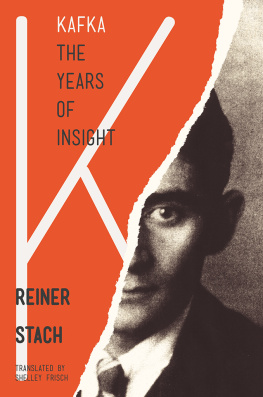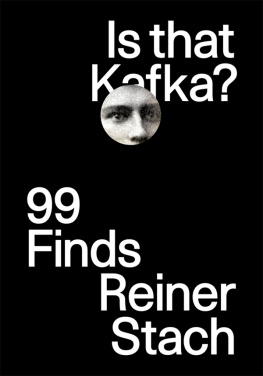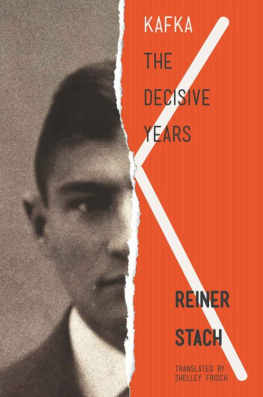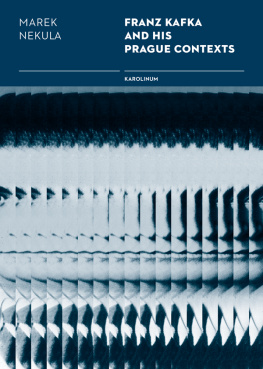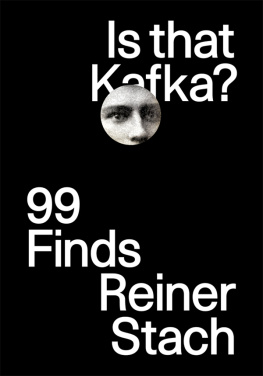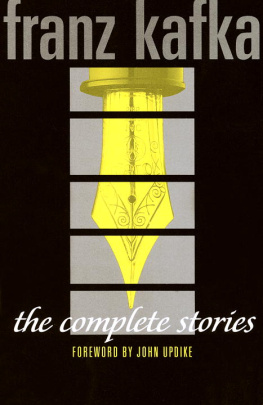KAFKA

KAFKA
THE YEARS OF INSIGHT
REINER STACH
TRANSLATED BY SHELLEY FRISCH
PRINCETON UNIVERSITY PRESS
Princeton and Oxford
Originally published in Germany as KafkaDie Jahre der Erkenntnis
S. Fischer Verlag GmbH, Frankfurt am Main 2008
Translation copyright 2013 by Princeton University Press
Published by Princeton University Press, 41 William Street, Princeton, New Jersey 08540
In the United Kingdom: Princeton University Press, 6 Oxford Street, Woodstock, Oxfordshire OX20 1TW
press.princeton.edu
Jacket photograph: Detail of a portrait of Austrian writer Franz Kafka (18831924)
as a young man, c. 1910. Photo Hulton Archive. Courtesy of Getty Images.
All Rights Reserved
Second printing, and first paperback printing, 2015
Paperback ISBN: 978-0-691-16584-4
The Library of Congress has cataloged the cloth edition as follows
Stach, Reiner.
[Kafka, die Jahre der Erkenntnis. English]
Kafka, the years of insight / Reiner Stach ; translated by Shelley Frisch. pages cm
Includes bibliographical references and index.
ISBN 978-0-691-14751-2 (hardback : alk. paper) 1. Kafka, Franz,
18831924. 2. Authors, Austrian20th centuryBiography. I. Frisch,
Shelley Laura, translator. II. Title.
PT2621.A26Z886313 2013
833'.912dc23
[B]
2012042048
British Library Cataloging-in-Publication Data is available
The translation of this work was funded by Geisteswissenschaften
InternationalTranslation Funding for Humanities and Social
Sciences from Germany, a joint initiative of the Fritz Thyssen
Foundation, the German Federal Foreign Office, the collecting society
VG WORT and the Brsenverein des Deutschen Buchhandels (German
Publishers & Booksellers Association)
10 9 8 7 6 5 4 3 2
eISBN 978-1-400-86545-1
R0
For Leo
KAFKA
PROLOGUE
The Ants of Prague
IN THE GEOGRAPHICAL HEART OF THE EUROPEAN CONTINENT LIES a forested region, far from the oceans and seas, with an unwelcoming climate and no natural resources to speak of. Repeatedly devastated by wars and epidemics, and fragmented over the centuries into politically insignificant parcels of land, it is a poor, empty center.
Rarely, and for only brief periods of time, the force field of power extended beyond its own borders. Decisions had always been handed down from elsewhere regarding the resources of the world, as had new, more efficient forms of economy and political rule. Even so, the residents of this region were able within a few generations to attain a level of wealth that was well above average for the scale of the world economy. At the threshold of the twentieth century, after a phase of hectic industrialization, the German Reich and Austria-Hungary were prosperous states with oversized armies, which trumpeted their newfound self-confidence. It took these parvenus a long time to realize that such a rapid upsurge would upset the global balance and exact a political price.
Suddenly they were encircled and threatened by covetous and malevolent neighbors. The leaders in Germany and Austria took too long to recognize that the older, most established Great Powers were using their edge in diplomatic skill and had no intention of standing aside in silence. They had likely already reached an agreement to occupy and exploit the emergent center togetherand the evidence to justify this suspicion kept mounting. In the East, Russia, a volatile colossus, prepared to send millions upon millions of slaves into a war of conquest. In the West, an envious France and British profiteers extolled the virtues of civilization while looking out for their bottom lines. And in the South, an opportunistic Italy, an ambitious satellite state, which despite its repeated promises to form alliances would clearly side with the majority. The circle was virtually closed; it was a strangulation that August 1, 1914, finally brought to a halt. That is how it was reported in the press, anyway. Within days, all those in the center wrapped their minds around a new, interesting-sounding notion: world war.
Dr. Kafka, a thirty-two-year-old unmarried Jewish official at the Workers Accident Insurance Institute in Prague, had yet to set eyes on the war a year later. A tall, slender, lanky man, who despite his youthful appearance was plagued by nervousness, headaches, and insomnia but was deemed fit for military service; back in June 1915, his fitness had been certified after a brief physical. But the insurance institutemost likely his superiors, Pfohl and Marschner, who were kindly disposed toward himclaimed that he had indispensable legal expertise, and the military authorities granted their petition. Kafkas name was entered onto the muster roll of some auxiliary unit pro forma, but with a stipulation that the man in question was excused indefinitely.
Not long before, when the war was still young, yet the patriotic fervor had already faded, Dr. Kafka took a brief trip to Hungary and the supply center of the Carpathian front. There were officers in German uniforms, field chaplains, Red Cross nurses, hospital trains, cannons ready for shipment in accordance with regulations, and, above all, refugeeswhole columns of ragged refugees from Poland and Galicia who had just escaped from the advancing Russians and were now streaming toward the visitor. He observed the preparations for events of enormous proportion that loomed ahead, and he saw where they would lead. But what about the essence, the great battle, the great liberation? The movies and newsreels tilted their coverage away from the wretched, mundane details.
Kafka was not alone with his doubts. People back home learned from newspapers and a limited number of silent and unrevealing newsreel images about the exciting, adventurous dynamic of the war, the use of the latest technology, the camaraderie, and the impressive ability of the troops to hold their ground. In their own everyday lives, civilians experienced a scarcity of foodand what little could be had was of poor qualityand a lack of heat in their homes. There was also rampant inflation, censorship, harassment from the authorities, and militarization yet neglect of the public space. The press called this area the home front, but the lie of this concept was all too apparent, and no one took it seriously. Only those on the actual front experienced anything, while people back home were condemned to passive endurance, the origin and meaning of which they had to infer from overblown military progress reports. The yawning abyss between these reports and the situation at home made for a potentially perilous discontent.
Presentation was one of the modern and still-unfamiliar pressing issues facing politicians as the war dragged on: if it could not be won soon, it would have to be sold more effectively. It was thus a welcome, if somewhat obvious and propagandistic, idea to give the civilian population a taste of the real war, so as to bring them into close fellowship with the troops. The idea was to replicate the war at home, but not in the form of those unspeakable exhibits of weapons and flags that mummified the battles of the nineteenth century and put historical showpieces on a par with antiquated natural history collections. Instead, urban dwellerseven with their dulled senseswould be offered something they could ponder and tell stories about for a long time to come.
Just after the onset of the war, seized weapons were paraded through the cities in triumph, and the much-vaunted Leipzig International Trade Fair for Books and Graphic Arts (which Dr. Kafka, who was interested in literature, had of course already seen) opened its own war division featuring a cheap thrill that was gratefully embraced by the public: four wax enemy soldiers brandishing weapons and staring down visitors. Back in the fall of 1914, no one had come up with the idea that people could actually reenact the war instead of remaining mere spectators from afar. War was pictured as an extensive, explosive, and expansive movement incapable of replication. It was only when the war got bogged down that the key role of the trencheslong predicted by military expertsopened up the possibility of actually playing at war. Burrowing in the earth could be done anywhere, so why not at Reichskanzlerplatz in the west end of Berlin? In the summer of 1915, the inquisitive got a chance to climb into a dry, clean-swept, wood-paneled model trench.

